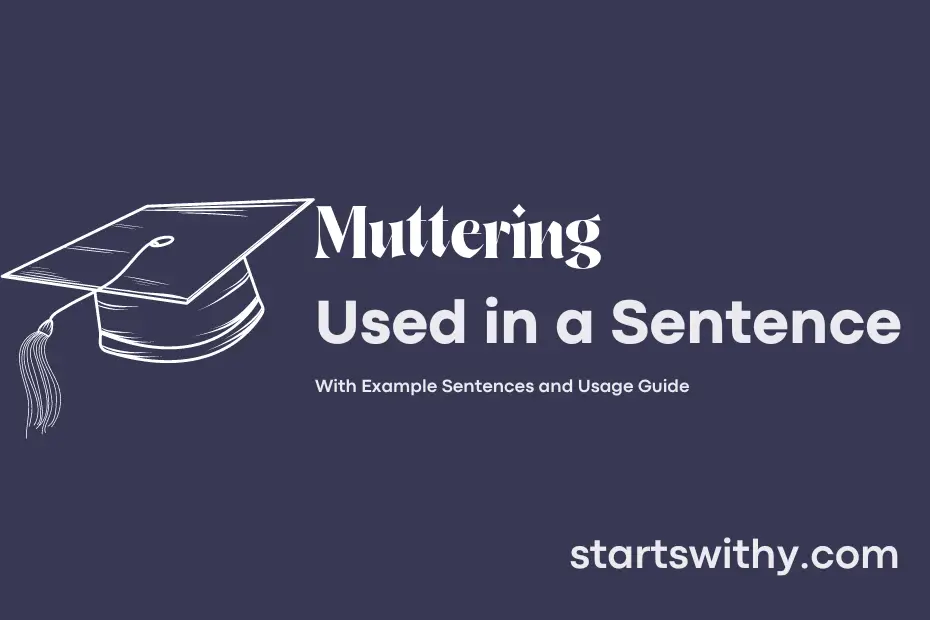Do you know what “muttering” means? Muttering refers to speaking quietly and indistinctly, often in an irritated or discontented manner. It is a form of low-volume speech that is usually intended for oneself or a small audience, without clear enunciation.
Muttering can convey a range of emotions, from annoyance and frustration to secretiveness and contemplation. It is a common way for individuals to express their thoughts and feelings without drawing attention to themselves, often done under one’s breath or in a mumbled tone.
7 Examples Of Muttering Used In a Sentence For Kids
- Muttering quietly helps us think.
- She was muttering a secret to her friend.
- The old man was heard muttering to himself.
- Why are you always muttering to yourself?
- The witch was muttering a spell.
- Muttering can sometimes be rude.
- When reading, avoid muttering out loud.
14 Sentences with Muttering Examples
- Muttering to themselves, some students struggled to understand the complex mathematical concepts.
- The professor noticed a student muttering frustratedly as they tried to solve a programming problem.
- During exams, you could hear students muttering formulas and equations under their breath.
- In the library, students could be seen muttering lines from their textbook as they attempted to memorize them.
- A group of friends sat together, muttering anxiously about their upcoming presentations.
- Walking through the campus, you could catch snippets of students muttering about upcoming deadlines.
- At the cafeteria, students could be heard muttering about the lack of vegetarian options.
- As they worked on group projects, you could hear students muttering ideas and suggestions to each other.
- Muttering quietly, a student tried to remember all the key points for their history exam.
- Sipping on their chai, students could be seen muttering about their plans for the weekend.
- Muttering to themselves, some students found it difficult to concentrate in the noisy common area.
- During breaks between classes, students could be found muttering about their favorite shows and movies.
- While waiting for their professor to arrive, students could be heard muttering about the upcoming college fest.
- The student sitting in the back of the classroom was caught muttering to themselves as they tried to complete their assignment.
How To Use Muttering in Sentences?
To mutter effectively in a sentence, try incorporating it as a verb that describes speaking quietly and inarticulately. For instance, “He would mutter under his breath whenever he was angry.” This showcases how the word can be used to describe someone speaking softly or unclearly due to their emotions.
It’s vital to remember that muttering is typically associated with talking in a low tone or mumbling. For example, “She could hear him muttering to himself as he paced back and forth.” This sentence demonstrates how muttering can indicate someone speaking softly to themselves.
When using muttering in a sentence, consider the context in which the word is being used. “The old man would often be found muttering about the good old days.” This example emphasizes how muttering can convey a sense of nostalgia or reminiscence.
Overall, incorporating muttering into your writing can add depth and emotion to your descriptions. Experiment with using it in various situations to get a feel for how it can enhance your storytelling or communication. With practice, you’ll become more confident in using muttering effectively in your sentences.
Conclusion
In conclusion, muttering often involves speaking quietly and indistinctly, typically due to frustration, confusion, or secrecy. This form of speech can be heard in a variety of settings, such as during arguments, while reading aloud to oneself, or when trying to keep a conversation private in a public setting. Muttering can also be a sign of discomfort or discontentment, serving as a way for individuals to express their emotions without drawing too much attention to themselves.
Overall, muttering plays a significant role in communication, allowing individuals to convey their thoughts and feelings in a discreet manner. Whether it is used to express frustration, share secrets, or speak quietly to oneself, muttering serves as a unique form of verbal expression that adds depth and nuance to human interactions.



